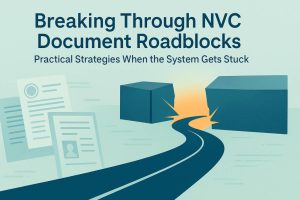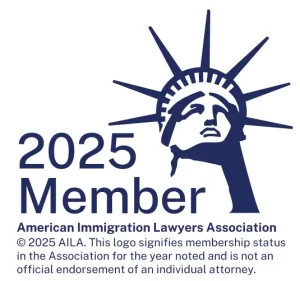For immigration attorneys and applicants navigating consular processing, the National Visa Center (NVC) can sometimes feel like an impenetrable barrier. While the NVC appears to function as a strict gatekeeper, requiring perfect documentation before forwarding cases to consulates, experienced practitioners know there are legitimate strategies to overcome document-related roadblocks that can save cases from indefinite delays.
Understanding NVC’s Official Role
The NVC is designed to ensure that only documentarily qualified cases reach U.S. consulates for immigrant visa interviews. This pre-screening process serves important functions:
- Quality Control: Prevents incomplete applications from reaching already-backlogged consulates
- Efficiency: Reduces the likelihood of interview postponements due to missing documentation
- Standardization: Ensures consistent document review across all cases
When NVC reviews submitted documents, they typically respond with either “Documentarily Complete” status or “Corrections Required.” The latter triggers a cycle where applicants must delete rejected documents and resubmit corrected versions.
When the System Gets Stuck: Common Document Challenges
Despite its systematic approach, NVC review can become problematic in several scenarios:
The “Wrong Type” Document Problem
Sometimes NVC acknowledges that a submitted document is what it claims to be (e.g., a birth certificate) but rejects it as the “wrong type.” This frequently occurs with countries that issue multiple versions of vital documents, where the applicant may only have access to one version due to administrative limitations or document availability in their home country.
Legibility Issues with Authentic Documents
NVC may reject documents as “illegible” even when the submitted version represents the best available copy from the issuing authority. This commonly affects older documents from certain countries where record-keeping standards or reproduction quality may be poor, but the document itself is the official version available from government sources.
Complex I-864 Affidavit of Support Issues
NVC staff may struggle with complicated financial documentation or unique sponsor situations, leading to repeated rejections of properly prepared I-864 packages that would be acceptable to experienced consular officers.
Practical Strategies for Breaking Through Document Roadblocks
Experienced immigration attorneys have developed several effective approaches for cases stuck in NVC document review:
1. Request Supervisor Review
When facing repeated rejections of correct documents, attorneys and applicants can request escalation to a supervisor. The most effective approach is to include a cover sheet with your document resubmission specifically requesting supervisor review of the rejection.
Key Point: This isn’t about submitting different documents—it’s about getting a second opinion on whether your correct documents should be accepted.
2. The Three-Try Principle
While not written policy, practitioner experience suggests that NVC will typically forward a case to the consulate after three unsuccessful attempts to resolve a specific document issue, with one important exception: police certificates that are obtainable must be provided. This principle applies per document or per specific issue, not per overall case submission.
Important Exception: This informal practice does NOT apply to police certificates that are available from the issuing country according to the State Department reciprocity schedule. NVC will not forward cases missing obtainable police certificates, though they will forward cases when the reciprocity schedule confirms police certificates are unobtainable.
3. Request Direct Forwarding to Consulate
In appropriate circumstances, attorneys can request that NVC forward the case directly to the consulate for determination. This strategy is particularly useful for:
- Complex I-864 situations that may be beyond NVC staff expertise
- Document authenticity questions better resolved by consular officers
- Cases where the attorney is confident the documentation meets requirements despite NVC’s concerns
4. The “Push-Me-Pull-You” Strategy
When standard approaches stall, attorneys can create pressure from both directions by simultaneously maintaining the supervisor review request at NVC while asking the consulate to actively request the case be transferred to them for adjudication. This dual-pressure approach can be particularly effective when:
- Multiple family members have cases at different stages of processing
- The consulate has an interest in consolidated interviews for efficiency
- Document disputes have extended beyond reasonable timeframes
- The case presents factors that make consulate-level review more appropriate
Tactical Consideration: When requesting consulate intervention, frame the request in terms of judicial economy and resource management. For example, if other family members have already been scheduled for interviews or one case has been forwarded while another remains stuck, emphasize that consolidated processing serves both the applicant’s and the government’s interests.
Building Your Documentation Strategy
Document Your Efforts
When pursuing these strategies, maintain clear records of:
- Each submission attempt and NVC’s specific objections
- Explanations provided with resubmissions
- Any communication with NVC supervisors
- Evidence that submitted documents represent the best available versions
- Timeline of all actions taken across multiple strategies
Tailor Your Explanation
When resubmitting documents, include clear explanations addressing NVC’s specific concerns. For example:
- If NVC claims a document is the “wrong type,” explain why this is the only version available or appropriate under the issuing country’s document systems
- If legibility is questioned, certify that this represents the best copy available from the issuing authority, supported by correspondence from that authority if possible
- For complex I-864 situations, provide detailed explanations of unique circumstances with supporting legal citations
Know When to Escalate
Consider requesting supervisor review or direct forwarding when:
- You’ve made multiple good-faith attempts to address NVC concerns
- You’re confident your documents meet legal requirements
- NVC’s objections appear to misunderstand document authenticity or availability
- Continued delays would prejudice your client’s case
- Other family members’ cases are ready for interview, creating inefficiency
Strategic Persistence: When One Approach Isn’t Enough
Real-world immigration practice teaches that bureaucratic roadblocks sometimes require deploying multiple strategies simultaneously or sequentially. Success often comes not from a single perfect solution, but from persistent, multi-pronged advocacy that demonstrates both the legal sufficiency of the application and the practical need for consulate-level review.
A Real-World Application
Consider a scenario where multiple family members are processing immigrant visa applications, but one beneficiary’s case becomes stuck at NVC over a civil document dispute. The document in question is authentic and represents the only version available from the issuing country’s government, yet NVC repeatedly rejects it as inadequate.
In such cases, a comprehensive advocacy strategy might include:
- Initial supervisor review request with detailed explanation of document authenticity
- Continued resubmission with increasingly detailed country-specific documentation explaining why this is the correct document
- Simultaneous consulate communication highlighting that other family members are ready for interview and noting the inefficiency of split processing
- Follow-up emphasizing judicial economy if other cases in the family have already been forwarded to the consulate
This multi-faceted approach—maintaining pressure at NVC through proper channels while simultaneously providing the consulate with reasons to request the case—creates legitimate pathways for resolution. The key is persistence combined with substantive legal arguments at each intervention point.
Critical Insight: Sometimes the breakthrough comes not from convincing NVC that the document is acceptable, but from convincing the consulate that they should take jurisdiction over the case. Consular officers typically have broader discretion and more experience evaluating complex document scenarios than NVC staff.
The Consulate Alternative: Why This Matters
Understanding these strategies is crucial because consular officers typically have more experience and authority to evaluate complex document situations than NVC staff. Consulates routinely handle:
- Document authenticity questions
- Country-specific availability issues
- Complex financial sponsor situations
- Discretionary determinations about document sufficiency
Rather than allowing cases to stagnate indefinitely at NVC, these strategies can move qualified applicants to the appropriate decision-maker: the consular officer conducting the immigrant visa interview.
Conclusion: NVC as Process Step, Not Final Authority
While NVC serves important quality control functions, it should not become an insurmountable barrier for properly documented cases. The strategies outlined here—supervisor appeals, the three-try principle, direct forwarding requests, and the push-me-pull-you approach—represent legitimate approaches developed through practitioner experience.
These techniques acknowledge that NVC staff, while dedicated, may not have the expertise or authority to resolve every document question that arises. By understanding when and how to escalate beyond standard NVC review, attorneys can better serve their clients and prevent qualified cases from becoming trapped in bureaucratic loops.
Immigration cases often require creative problem-solving within the bounds of proper procedure. When standard approaches fail, strategic persistence using multiple legitimate tools simultaneously can mean the difference between indefinite delay and successful case resolution.
Remember: the goal is not to bypass legitimate document requirements, but to ensure that cases with proper documentation reach the appropriate decision-maker for final adjudication. Sometimes that means being willing to try every available avenue until you find the one that works.

